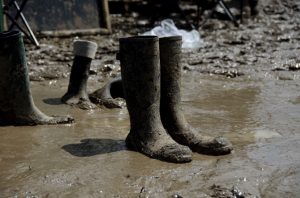Reduce Reducing waste at festivals
The average festival attendee creates 2kg of waste per day (source: The show must go on 2020 update). Over 5 million UK residents attend at least one festival per year, joining an estimated 1.1 million “festival tourists” from overseas, so it’s easy to see how festivals create an estimated 25,800 tonnes of waste every year. Of that, 37% will be recycled on average.
83% of festivalgoers expect all of the festivals they attend to tackle their environmental impacts, and 89% of people attending music festivals say they want to be more responsible for the waste they produce. Although many festivals are making efforts to improve their collection facilities and boost recycling, the statistics highlight that there’s a gap between these good intentions and behaviour. We’ve looked at these figures and put together some simple tips to keep unnecessary and non-recyclable waste to a minimum.

Tents
Approximately 250,000 tents are abandoned at festival campsites in the UK each year.
52% of festival-goers consider tents to be single use items, and there’s a popular misconception that tents left at festivals will be collected and donated to charities, which adds to the problem.
In reality, abandoned tents are routinely flattened by security guards as they check for anyone in them prior to site clean up. As a result 90% of tents left at festival sites are irreparably damaged so can’t be reused and, because tents are difficult to recycle, they end up being disposed of at landfill or are incinerated.
https://www.youtube.com/watch?v=_RDj27Qg5jE
How to take action
- Avoid cheap ‘single use’ festival tents and invest in a sturdy reusable tent instead.
- If you really don’t want to keep your tent after the festival and like the idea of giving it to charity instead, ensure it’s clean, dry, complete and in good working order then take it to a charity donation point (if there is one at the festival site) or to a charity shop when you return home.
- Consider borrowing or renting a tent instead of buying one
- If you know you aren’t going to keep or pass on your tent for reuse, make sure the one you choose is at least recyclable. Fully recyclable cardboard tents might be a good option (although they are still single-use items). However, never assume that your recyclable tent will be recycled if you just leave it in a field; instead, dispose of it properly using festival recycling facilities.

Choose reusable food and drinks containers, and avoid litter
Festival-goers in the UK collectively discard around 1.3 million single-use food containers, 2 million plastic bottles, and 875,000 plastic cups during a typical festival season. A significant proportion of this waste is littered; mixed with mud and non-recyclable waste, which makes a lot of otherwise recyclable items unrecyclable.
How to take action
- Avoid single use items and invest in reusable containers, plates, cutlery, water bottles and cups instead and remember to bring them home afterwards.
- If you’ve paid a deposit for a reusable cup at the festival, hang on to it and retrieve your deposit.
- Don’t litter, make use of the on-site recycling and waste disposal facilities responsibly.
- Pick up litter (even if it’s not yours) and dispose of it properly. You could make a tidy profit collecting and returning reusable cups if there’s a deposit scheme.

Look after your clothing and kit
In 2018, more than 80 tonnes of abandoned clothing were collected at a single music festival.
A survey of Glastonbury festival goers revealed that 58% of attendees had lost, left or broken items at the festival, even though 80% claimed they had bought new items specifically for the weekend.
How to take action
- Save some cash and choose to reuse clothing and kit you already own rather than getting something new.
- Break out the scissors and thread to transform your less worn pieces into one-of-a-kind festival outfits. YouTube is a great resource for clothing alteration ideas and how to guides.
- Reuse, borrow or thrift accessories to give your outfits a different look each time you wear them: sunglasses, hats, belts, jewellery…
- Borrow items you need but don’t already own; swap with your friends and you’ll have double the clothes to mix and match from.
- If you can’t borrow what you need, search the second-hand market before buying new, think charity shops, Vinted, Depop and vintage markets.
- Take everything home with you and resell or donate anything you don’t want to keep.
- If you have garments or items that are damaged or worn to the point they can’t be reused, re-sold or re-donated to charity, recycle as much as possible.
- If you’re buying festival merch, pick stuff made from sustainable materials and/or things you’ll use beyond the festival as part of a capsule wardrobe.
Also in Reduce Sub menu










